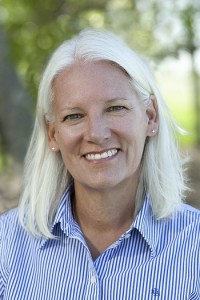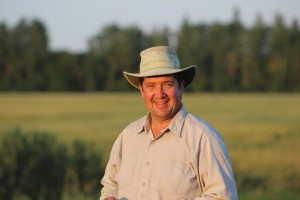
Discovery Talks
Agro-Ecosystem Productivity and Health
 Innovative Environmentally Friendly Methods to Manage Diseases of Field Crops
Innovative Environmentally Friendly Methods to Manage Diseases of Field Crops
by Dr. Dilantha Fernando, Professor, Agricultural and Food Sciences, University of Manitoba
Agricultural crops feed the world. Management of diseases is paramount to the sustainability of production. Use of chemicals has been the main stay in disease management. However, there are consequences such as contamination of the environment or harmful health effects on growers due to the excessive use of these chemicals.
New technologies used in breeding for disease resistance, and using alternative methods to chemical control such as biological control are innovative and environmentally-friendly. In addition, identifying key defense genes and transferring them to a desired crop against both abiotic and biotic diseases through cutting-edge technologies is now possible. These innovative and environmentally-friendly methods will be presented for discussion.
PDF – Dilantha Fernando – AIC 2017 Presentation
 Manitoba Beef & Forage Initiatives: A Partnership to Inform and Support Adoption at the Farm
Manitoba Beef & Forage Initiatives: A Partnership to Inform and Support Adoption at the Farm
by Glenn Friesen, Industry Development Specialist, Manitoba Agriculture – Livestock Industry Branch
This presentation reviews the genesis of MBFI’s applied-research farm and communication model, the importance of partnerships, the inclusion of all stakeholders, and a review what we’ve learned in the short time of MBFI’s existence. Along with a focus on improving economic sustainability of Canadian farmers, MBFI’s mandate is to provide a platform to study and demonstrate the impacts of agriculture on our environment.
Learning is best accomplished through observance and practice; MBFI supports this by providing a field-scale hands-on opportunity for the current and the next generation of producers to observe and experience innovative production practices, and their measured impacts on the environment and their bottom line.
PDF – Glenn Friesen – AIC 2017 Presentation
2-3DT-Friesen-20170501
 The Last Mile – Commercializing Disruptive Ideas
The Last Mile – Commercializing Disruptive Ideas
by Alison Sunstrum, CEO, GrowSafe Systems
By 2050, the world must produce 70% more animal protein to feed a growing population. Animal agriculture will need to do more with less, and do so sustainably. GrowSafe’s decision making “Internet of Livestock Things” platform uses physical sensing, cognitive computing and predictive analytics to measure, monitor, predict, mitigate and optimize “novel things” on a sustainable operation. GrowSafe’s journey of bringing ideas to often
resistant stakeholders in the face of financial, legislative, physical and ethical obstacles gives insight into the conundrum of bringing innovation the last mile to market adoption.
PDF – Alison Sunstrum – AIC 2017 Presentation
Panels & Forum
Cross-Sectoral Dialogue on the Adoption of Environmentally Sustainable Innovations
 Agricultural Practices to Improve Input and Resource Use Efficiency in Cropping Systems
Agricultural Practices to Improve Input and Resource Use Efficiency in Cropping Systems
by Dr. Mohammad Khakbazan, Research Scientist, Agriculture and Agri-Food Canada, Brandon R&D Centre
Intensive agricultural production systems rely on the heavy use of external resources including high rates of fertilizer and pesticides, and intensive use of machinery and fossil fuel energy. The intensive use of such inputs can negatively impact public health and the environment including soil and water quality, and also affect farm economics. Agricultural systems can reduce resource consumption and environmental impacts through the adoption of new technologies and alternative management practices. The objective of this presentation is to use data from various projects across Western Canada to evaluate conservation land, nutrient, and crop management practices that improve resource use efficiency in agricultural production.
PDF – Mohammad Khakbazan – AIC 2017 Presentation
 Adapting Agriculture to Climate Change
Adapting Agriculture to Climate Change
by Dan Mazier, President, Keystone Agricultural Producers
Keystone Agricultural Producers (KAP) is working with Manitoba farmers and the provincial government to find an approach to carbon pricing that will keep costs manageable and help to incentivize carbon sequestration through an Alternative Land Use Services framework. KAP is also consulting farmers to determine the next steps needed to adapt to climate change. Dan Mazier will discuss KAP’s progress to date on these projects.
PDF – Dan Mazier – AIC 2017 Presentation
 Sustainability in Agriculture: The Big Picture
Sustainability in Agriculture: The Big Picture
by Jolene Noble, Extension Coordinator, Alberta Farm Sustainability Extension Working Group
Sustainability is not a new concept to those in the agriculture industry but it is a phrase that has gained significant attention in the media and by consumers over the past few years. Many consumers are looking to purchase sustainably sourced food products and are doing so by comparing labels and stamps on the packaging. Is the cropping sector ready to meet sustainable sourcing requirements? The Alberta crop commissions are working to identify the sustainable practices that are already commonplace on Alberta farms and to supply growers with the information and tools necessary to respond to the call for sustainable food products.
PDF – Jolene Noble – AIC 2017 Presentation
 Assurance and Innovation: Building Blocks to a Sustainable Dairy Industry
Assurance and Innovation: Building Blocks to a Sustainable Dairy Industry
by David Wiens, Vice-President, Dairy Farmers of Canada and Chair, Dairy
Farmers of Manitoba
The Canadian dairy industry is actively implementing its proAction® initiative to demonstrate sustainable dairying and to measure and encourage continuous improvement over time. The presentation will provide an overview of the initiative, situating the environment module within the industry’s assurance program, and providing the research context and on-farm realities for the program. The presentation will also focus on the benefit of building upon the environmental farm plan and the challenges involved in developing environmental requirements within a mandatory assurance system.
